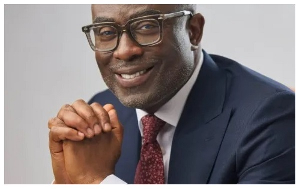- Home - News
- TWI News | TV
- Polls
- Year In Review
- News Archive
- Crime & Punishment
- Politics
- Regional
- Editorial
- Health
- Ghanaians Abroad
- Tabloid
- Africa
- Religion
- Election 2020
- Coronavirus
- News Videos | TV
- Photo Archives
- News Headlines
- Press Release
General News of Thursday, 27 November 2003
Source: GNA
Driver tells his story at the NRC
A former driver of the Ministry of Health driver at the Koforidua Central Hospital, Mr Anthony Kwabena Appiah said on Thursday that he was picked on false identity in 1979, from his house at Koforidua and sent to the Nsawam Prisons for more than four-and-half years.
Mr Appiah said the soldiers mistook him for Kwaku Appiah on his arrest, and added that no warrant covered his arrest, neither was he charged for any offence, nor tried before any court, but prison officials told him he was to serve 10 years when he was in jail.
Giving evidence at the National Reconciliation Commission (NRC) public hearing in Accra, Mr Appiah said the only time he appeared in court was when he petitioned against his detention under a different name, and even that the lady judge handling the case did not survive to see to the end of the case.
Witness said he heard the judge was later abducted and burned in 1983, two weeks after the first adjournment of the case.
Mr Appiah said the six soldiers who came for him beat him mercilessly on the way to the Nsawam Prisons, and took away his 50 packets of roofing sheets.
He said they also seized his two cars, which he bought with loans from an uncle, the bank and from his own resources, but he was informed later that the vehicles were repainted with different colours and parked at a place called Galloway in Koforidua, confiscated to the state with the police using them as operation cars.
According to Mr Appiah, said he had not been able to go back to work at the Ministry of Health, where he said he worked for 19 years.
He prayed the Commission to make a recommendation for him to get his benefits from the Ministry, and also compensated for his arrest and detention.
Mr James Okoe Quartey, another witness, told the Commission that police arrested him alongside a number of people in a pandemonium at the Akoto Lante and Mudor communities in Accra in 1958, when he was doing his normal work as meter reader on a week-end at homes he could not have access to read their meters during the weekdays.
He said the policemen who wielded truncheons and baskets did not accept his explanation that he was not part of the melee, but one of them rather snatched his identity card and threw it away.
Witness said when he tried to pick it, the policeman hit his waist hard with a truncheon, and said he had since had permanent pains in his waist, walking with a walking stick.
He said when he tried to get up, the policeman held him by the collar and marched him on to a standby vehicle already full of people arrested.
He said they were taken to the Central Police Station at Tudu, where both the men and women were put together in a single cell, and that they were only separated when an Inspector of police had intervened.
He said they were detained till evening, charged with "unlawful assembly", put before court and placed in custody for two more weeks, after which they were brought again before court and discharged.
Mr Quartey said he bore the expenses of his medical treatment, but he still walks with difficulty, but the police had not given any compensation for the brutalities they meted out to him.
When Mr Frederick Emmanuel Amoako Ofori, a former Accountant with the Ghana Publishing Corporation (GPC), took the witness seat, he complained of his interdiction, which was later changed to retirement in 1992.
He said he had then served the GPC for 27 years with a clean record, and by January 1990, he was the Acting Chief Internal Auditor, but his name was mentioned along with the Managing Director, the Solicitor and the Financial Secretary to report to the National Investigations Committee (NIC).
Mr Ofori said the NIC Commissioner Lamptey said he was surprised as to why his name was included in the list.
Witness said the then Information Secretary Mr Kofi Totobi Kwakyi did not delete his name, until 1992 when he (Mr Ofori) was rather retired, with the explanation that the GPC was being restructured.
Witness said although his salary difference for the period of interdiction was paid, his pension was small, and added that the pension would have been better if he had been allowed to serve the remaining five years left for him to retire.
He prayed the Commission to recommend for him to have the salary for the five years and other emoluments and entitlements.
Mr Herman Kwabena Agyapong, former Chairman of the local workers union of the Ghana Broadcasting Corporation (GBC) also prayed the Commission for compensation against his dismissal along with six other executives of the Union, and 31 other employees from the Corporation in November 1988.
He said the dismissal was on an allegation of organising a demonstration in the Broadcasting yard.
Mr Agyapong said he was not around when the said demonstration took place, and questioned how he could have been part of it.
He said the Collective Bargaining Agreement was not followed, but those alleged to be involved were rather dismissed rather than the Corporation setting up an investigative panel to look into the case.
Mr Agyapong said he made a number of petitions, some of which where sent to the Castle
He said after he had exposed the case at an international conference abroad, international pressure mounted on the Castle recommended their reinstatement, but witness said Mr George Aryee, then Director General of the GBC did not take them back.
Mr Agyapong said their dismissal was rather changed to termination of appointment, verbally rather than being officially informed with letters.
He said part of their benefits, were paid to them. He said "recommended salary, allowance, and other benefits for the period of the said dismissal" were not honoured.
Mr Agyapong said the case went to court, which declared the dismissal null and void, but GBC was yet to act.
The Commission requested Mr Agyapong who said the termination of their appointment was verbal to furnish it with copies of the dismissal letters and the court ruling.
Two other witnesses who complained of dismissals were Mr Edward Obiri Akuamoah-Boateng, of the then Post and Telecommunication, and ex- L/Cpl Alexander Adusei, formerly of the Recce Regiment.
Opinions









